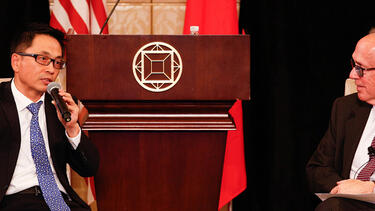Finance
The Corporation Is Centuries Older than We Thought
The genesis of the joint-stock company is usually traced to the founding of the English East India Company and the Dutch East India Company around 1600. New research co-authored by Prof. William Goetzmann says this origin story may be off by centuries.

Is Smart Beta Really So Smart?
Smart beta is the hot thing in investing strategies, marketed as a new way to diversify and reduce risk. But Eugene Podkaminer ’01 argues that common smart beta strategies recycle long-established methods and likely aren’t the most efficient way to achieve those goals.
Big Box Retailers Squeeze Smaller Suppliers by Borrowing from Them
Large, investment-grade companies such as Walmart and Home Depot that can easily borrow money in the capital markets often receive financing from their much smaller, credit-constrained suppliers. A new study examines the effects of this pattern of financing and finds that it squeezes small suppliers, creating a cash shortfall and causing them to cut back on capital investments.
How Do You Invest in a Changing China?
Lei Zhang ’02 has been one of the most successful investors in China during a time of unprecedented change. In a conversation with Yale’s Stephen Roach, he talked about rapid shifts in China’s business and culture, the birth of a consumer class, the Chinese innovation model, and the outmoded views of the country that remain prevalent in the West.

What’s the Right Algorithm for Quantitative Investing?
Computer-based trading dominates markets, with a majority of trading activity in major markets happening without any human intervention. Robert Litterman, a pioneer of the quantitative investing approach, spoke with Yale Insights about how ruthless competition keeps the field changing and why he believes human judgment remains an essential component of any strategy.

Are Real Estate Cycles Over?
A real estate boom can drive the construction of new homes, commercial centers, and skyscrapers, reshaping cities. The following bust can leave neighborhoods vacant. Have factors like the increasing availability of public information about real estate and the shift toward a global marketplace tamed a cycle that has played out repeatedly over the centuries?

When a Stock Market Theory Is Contagious
In a New York Times op-ed, Professor Robert J. Shiller explains that stock market movements are driven by popular narratives that spread like “thought viruses.” Secular stagnation—the idea that the global economy may languish for years to come—is the current story driving down the stock market. Whether true or false, the idea alone has the potential to erase five years of gains and create a bear market.
Have We Left the Financial Crisis Behind?
In the introductory lecture of his course Global Financial Crisis, Andrew Metrick describes how the financial panic of 2008 and the ensuing recession have created a new economic reality.
What Dangers Lurk for the Financial System?
Paul Tucker was one of the key players at the Bank of England during the financial crisis of 2008-09. He says that the actions of policymakers and regulators since that time have built a more resilient financial system. But he also sees big challenges ahead that will require regulators to be more nimble and flexible than they’ve ever been before.

How Does an IPO Affect Rival Firms?
The initial public offering (IPO) market recently saw its busiest week since 2001. A new study by Yale School of Management professors Matthew Spiegel and Heather Tookes reveals how these and other IPOs affect rival firms over time.
What Does the Future of the European Union Look Like from Spain?
Former Spanish prime minister José Luis Rodríguez Zapatero discusses Spain’s long, difficult recovery from the global economic crisis and the lessons of the crisis for the future of the European Union.